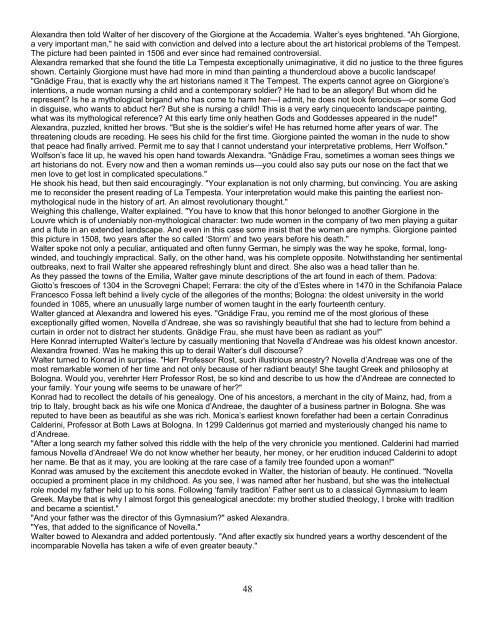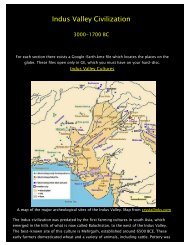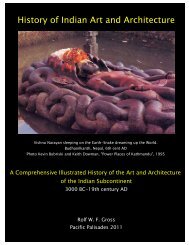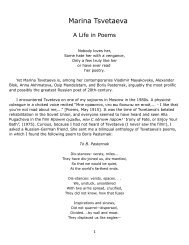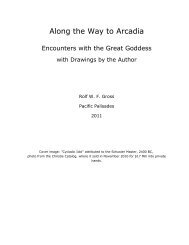Alex<strong>and</strong>ra then told Walter of her discovery of the Giorgione at the Accademia. Walter’s eyes brightened. "Ah Giorgione,a very important man," he said with conviction <strong>and</strong> delved into a lecture about the art historical problems of the Tempest.The picture had been painted in 1506 <strong>and</strong> ever since had remained controversial.Alex<strong>and</strong>ra remarked that she found the title La Tempesta exceptionally unimaginative, it did no justice to the three figuresshown. Certainly Giorgione must have had more in mind than painting a thundercloud above a bucolic l<strong>and</strong>scape!"Gnädige Frau, that is exactly why the art historians named it The Tempest. The experts cannot agree on Giorgione’sintentions, a nude woman nursing a child <strong>and</strong> a contemporary soldier? He had to be an allegory! But whom did herepresent? Is he a mythological brig<strong>and</strong> who has come to harm her—I admit, he does not look ferocious—or some Godin disguise, who wants to abduct her? But she is nursing a child! This is a very early cinquecento l<strong>and</strong>scape painting,what was its mythological reference? At this early time only heathen Gods <strong>and</strong> Goddesses appeared in the nude!"Alex<strong>and</strong>ra, puzzled, knitted her brows. "But she is the soldier’s wife! He has returned home after years of war. Thethreatening clouds are receding. He sees his child for the first time. Giorgione painted the woman in the nude to showthat peace had finally arrived. Permit me to say that I cannot underst<strong>and</strong> your interpretative problems, Herr Wolfson."Wolfson’s face lit up, he waved his open h<strong>and</strong> towards Alex<strong>and</strong>ra. "Gnädige Frau, sometimes a woman sees things weart historians do not. Every now <strong>and</strong> then a woman reminds us—you could also say puts our nose on the fact that wemen love to get lost in complicated speculations."He shook his head, but then said encouragingly. "Your explanation is not only charming, but convincing. You are askingme to reconsider the present reading of La Tempesta. Your interpretation would make this painting the earliest nonmythologicalnude in the history of art. An almost revolutionary thought."Weighing this challenge, Walter explained. "You have to know that this honor belonged to another Giorgione in theLouvre which is of undeniably non-mythological character: two nude women in the company of two men playing a guitar<strong>and</strong> a flute in an extended l<strong>and</strong>scape. And even in this case some insist that the women are nymphs. Giorgione paintedthis picture in 1508, two years after the so called ‘Storm’ <strong>and</strong> two years before his death."Walter spoke not only a peculiar, antiquated <strong>and</strong> often funny German, he simply was the way he spoke, formal, longwinded,<strong>and</strong> touchingly impractical. Sally, on the other h<strong>and</strong>, was his complete opposite. Notwithst<strong>and</strong>ing her sentimentaloutbreaks, next to frail Walter she appeared refreshingly blunt <strong>and</strong> direct. She also was a head taller than he.As they passed the towns of the Emilia, Walter gave minute descriptions of the art found in each of them. Padova:Giotto’s frescoes of 1304 in the Scrovegni Chapel; Ferrara: the city of the d’Estes where in 1470 in the Schifanoia PalaceFrancesco Fossa left behind a lively cycle of the allegories of the months; Bologna: the oldest university in the worldfounded in 1085, where an unusually large number of women taught in the early fourteenth century.Walter glanced at Alex<strong>and</strong>ra <strong>and</strong> lowered his eyes. "Gnädige Frau, you remind me of the most glorious of theseexceptionally gifted women, Novella d’Andreae, she was so ravishingly beautiful that she had to lecture from behind acurtain in order not to distract her students. Gnädige Frau, she must have been as radiant as you!"Here <strong>Konrad</strong> interrupted Walter’s lecture by casually mentioning that Novella d’Andreae was his oldest known ancestor.Alex<strong>and</strong>ra frowned. Was he making this up to derail Walter’s dull discourse?Walter turned to <strong>Konrad</strong> in surprise. "Herr Professor Rost, such illustrious ancestry? Novella d’Andreae was one of themost remarkable women of her time <strong>and</strong> not only because of her radiant beauty! She taught Greek <strong>and</strong> philosophy atBologna. Would you, verehrter Herr Professor Rost, be so kind <strong>and</strong> describe to us how the d’Andreae are connected toyour family. Your young wife seems to be unaware of her?"<strong>Konrad</strong> had to recollect the details of his genealogy. One of his ancestors, a merchant in the city of Mainz, had, from atrip to Italy, brought back as his wife one Monica d’Andreae, the daughter of a business partner in Bologna. She wasreputed to have been as beautiful as she was rich. Monica’s earliest known forefather had been a certain ConradinusCalderini, Professor at Both Laws at Bologna. In 1299 Calderinus got married <strong>and</strong> mysteriously changed his name tod’Andreae."After a long search my father solved this riddle with the help of the very chronicle you mentioned. Calderini had marriedfamous Novella d’Andreae! We do not know whether her beauty, her money, or her erudition induced Calderini to adopther name. Be that as it may, you are looking at the rare case of a family tree founded upon a woman!"<strong>Konrad</strong> was amused by the excitement this anecdote evoked in Walter, the historian of beauty. He continued. "Novellaoccupied a prominent place in my childhood. As you see, I was named after her husb<strong>and</strong>, but she was the intellectualrole model my father held up to his sons. Following ‘family tradition’ Father sent us to a classical Gymnasium to learnGreek. Maybe that is why I almost forgot this genealogical anecdote: my brother studied theology, I broke with tradition<strong>and</strong> became a scientist.""And your father was the director of this Gymnasium?" asked Alex<strong>and</strong>ra."Yes, that added to the significance of Novella."Walter bowed to Alex<strong>and</strong>ra <strong>and</strong> added portentously. "And after exactly six hundred years a worthy descendent of theincomparable Novella has taken a wife of even greater beauty."48
14.Tuscany - the Wolfsons' House in Fiesole1899When they arrived in Florence the Wolfsons insisted that <strong>Konrad</strong> <strong>and</strong> Alex<strong>and</strong>ra stay with them in Fiesole. A shiny, newDaimler touring car with a charming Italian chauffeur waited for them at the station—<strong>Konrad</strong> <strong>and</strong> Alex<strong>and</strong>ra’s first rideever in an automobile.Hidden in a steep orchard of olives, vines, <strong>and</strong> lemons they discovered Villa Tasso. Originally built for the sixteenthcenturypoet Torquato Tasso, the villa had last been owned by Gabriele d’Annuncio, who had sold the property to theWolfsons to cover the debts of his extravagant lifestyle.The rustic two-story building was filled with Italian Renaissance paintings, <strong>and</strong> a few contemporary ones. In Walter’sroom hung a number of Byzantine icons from the Balkans, Greece, <strong>and</strong> Russia. More Byzantine treasures, ivories,jewelry, <strong>and</strong> glowing gold <strong>and</strong> enamel cloisonnés, were hidden in a tresor deep in the basement.Sally gave Alex<strong>and</strong>ra <strong>and</strong> <strong>Konrad</strong> two connecting rooms on the second floor with a delightful view. Between silver-greenolive trees they looked down on the red <strong>and</strong> sienna-brown roofs of Florence.. A view as tranquil as from Zaguramo.At night two other guests appeared, a doctoral student of art history from Harvard <strong>and</strong> Katharina, a young Germanpainter from Munich, who was spending two months in Italy. Their dinners were lively gatherings with conversations inseveral languages. Alex<strong>and</strong>ra immediately felt at home. She became Katharina’s close friend, who taught her Italian.Katharina was exploring the dissolution of geometrical reality into light <strong>and</strong> colors. She had fallen in love with a Russianpainter by the name of Wassily K<strong>and</strong>insky who had been her teacher in Munich <strong>and</strong> had sent her to Italy. K<strong>and</strong>insky’sidea to create a new spirituality in painting had started her on this project.The best times were the long evenings on the terrace under the olive trees. Over coffee or a glass of wine, Walter wouldhold forth on the wonders <strong>and</strong> treasures of Tuscany, the history of its painters <strong>and</strong> architects. Most often he directed hislectures at Alex<strong>and</strong>ra, who followed his words with rapt attention.Occasionally Walter would have his chauffeur motor them to some of the places he had described the previous night: toLucca, through the valley of the upper Arno to San Sepolcro to see the frescoes of Piero della Francesca, the Greve <strong>and</strong>Siena. Walter would not accompany them, he wanted to give Alex<strong>and</strong>ra the freedom to learn to see with her own eyes,but in the evening she had to give him detailed reports of what she had seen.This improvised course in art history gave Walter as much pleasure as Alex<strong>and</strong>ra. He maintained that he had never hada more eager <strong>and</strong> intelligent student. After a while, in the excitement of these evenings, Walter even arrived at an easyAlex<strong>and</strong>ra, dropping the ‘Gnädige Frau’ <strong>and</strong> the formal ‘Sie.’However, to the Uffizi Walter took her himself. He led her first into a room filled with glowing religious panels, altar leaves,Madonnas, icons of saints, prophets, <strong>and</strong> angels in elaborate Gothic settings. The profusion of gold surfaces oppressedAlex<strong>and</strong>ra. Since her discovery of Giorgione at the Accademia she was looking for something new, something beyondthe Byzantine art she had grown up with.She was about to beg Walter to take her to the adjacent Renaissance room when he paused before a Madonna. A labelidentified the altar leaf: Madonna Rucellai, Duccio, 1285. The Mother of God sat on an elaborately carved throne before ashimmering gold background wearing a blue, hooded cloak. On her knee an age-old Christ child wrapped in a purplecloth extending his right h<strong>and</strong> in blessing. Six angels in colorful garments held onto a curtain behind mother <strong>and</strong> child."Look at this Madonna, Alex<strong>and</strong>ra, first from a distance then close up. This Duccio is one of the most splendid Byzantinegold-ground panels of Tuscany painted just before the revolution of the Renaissance. Duccio’s formality is derived fromConstantinople, but he infused this Madonna <strong>and</strong> the folds of her garment with a fluidity that is thoroughly Italian."Walter waved his outstretched arm at the other paintings in the room. "In our eyes the beauty of these Byzantine panelslies in their hierarchical monumentality. The artist <strong>and</strong> the viewers were not aware of this beauty, their feelings wereentirely unimportant. These images showed the spiritual powers of the depicted saint. He <strong>and</strong> his icon were consideredidentical by the believers. I love the Byzantine images because of their forbidding magnificence, not because of theirspiritual content. I am not a believer."He pointed at the Duccio Madonna. "Now look closer. The painting is two-dimensional, it has no depth. Obviously Ducciodid not know how to create the illusion of three-dimensional perspective on a flat surface."Alex<strong>and</strong>ra tilted her head <strong>and</strong> looked at the painting again. She turned to Walter. "To me this painting appears perfectlyreasonable. In Georgian <strong>and</strong> Russian a saint is a Lightman of otherworldly splendor."Walter looked at the floor. "You don’t see that? I want to show you why the Renaissance discovery of three-dimensionalpainting was so important to our thinking. As you say, in Russia <strong>and</strong> here too Christ, the Madonna, <strong>and</strong> the saints weresuperhuman. They were different from ordinary people. The Renaissance changed all that <strong>and</strong> with it our entire attitude."Walter took her before a large triptych in the next room. In the center a lovely Madonna was sitting on a raised throne,her sturdy child stood on her lap, as children do when they first test their legs. Two angels in the foreground with their49
- Page 3 and 4: Table of Contents1. My Grandfather'
- Page 5 and 6: 1.My Grandfather's Watch among the
- Page 7 and 8: ditch beside the road.Mother was tr
- Page 9 and 10: Deep snow still covered Djvari Pass
- Page 11 and 12: "But you know nothing about how to
- Page 13 and 14: newborn baby! You won’t need a ba
- Page 15 and 16: Dadiani bent over the table, reache
- Page 17 and 18: Autumn had come to Georgia, and it
- Page 19 and 20: "Gespenstisch!" whispered Mouravi t
- Page 21 and 22: Finally, depressed by his inability
- Page 23 and 24: They slowly rode up the hill north
- Page 25 and 26: On their way back to the Lavra Alex
- Page 27 and 28: Blushing like a young girl, she gav
- Page 29 and 30: Alexandra bowed deeply to a middle-
- Page 31 and 32: All applauded and Ilia made a small
- Page 33 and 34: She had done her hair up in a new w
- Page 35 and 36: ape her. But then he must die, and
- Page 37 and 38: a rear door when she entered.If Per
- Page 39 and 40: Alexandra went purple with embarras
- Page 41 and 42: The smell of roasting lamb wafted t
- Page 43 and 44: Konrad quietly sat back. To his gre
- Page 45 and 46: The tall, dark-haired woman began w
- Page 47: She kissed him."Maybe you dream of
- Page 51 and 52: ut are, unjustly, much more famous.
- Page 53 and 54: Alexandra had fallen into melanchol
- Page 55 and 56: She kissed him tenderly. "Niko, I a
- Page 57 and 58: obligations, and she, ever since th
- Page 59 and 60: months, was flooded with the diffus
- Page 61 and 62: could they be aroused into communal
- Page 63 and 64: 19.An unexpected encounter with Vla
- Page 65 and 66: chauffeur drop me at the station ju
- Page 67 and 68: She described her sensation of flyi
- Page 69 and 70: sky a thin, transparent blue. Imbed
- Page 71 and 72: interest in Theosophy."Marti shrugg
- Page 73 and 74: to?Mother had never mentioned any d
- Page 75 and 76: "Ah, of course, of course, ‘Eine
- Page 77 and 78: Konrad agreed that this sounded mor
- Page 79 and 80: patriarchal oak and smiled, a littl
- Page 81 and 82: have a similar situation in our vil
- Page 83 and 84: Alexandra disagreed. "Most abortive
- Page 85 and 86: a limited edition, hand-screened ma
- Page 87 and 88: Alexandra touched her necklace and
- Page 89 and 90: close!"She had hugged him, tears ru
- Page 91 and 92: The others came lumbering up the st
- Page 93 and 94: urden the heart with this task, whi
- Page 95 and 96: the colors mixed and changed depend
- Page 97 and 98: 28.Kandinsky's suprising confession
- Page 99 and 100:
With kisses Alexandra removed the v
- Page 101 and 102:
He knelt, removed her knee and leg
- Page 103 and 104:
Joachim viewed Konrad with sympathe
- Page 105 and 106:
The rumbling continued at regular i
- Page 107 and 108:
Russia."She picked up a piece of br
- Page 109 and 110:
conservative pessimism, demanded th
- Page 111 and 112:
preventative method and taking it e
- Page 113 and 114:
new provocation in modern music and
- Page 115 and 116:
exhausted the Renaissance idea of b
- Page 117 and 118:
creative clairvoyance, and her shar
- Page 119 and 120:
Left to herself, Alexandra, awed, w
- Page 121 and 122:
public. She fended off the fuzzy wo
- Page 123 and 124:
ailways on strike. The strike had t
- Page 125 and 126:
Grandfather was very sad when he fo
- Page 127 and 128:
and put on his coat and shoes, he r
- Page 129 and 130:
Alexandra not in the mood to give V
- Page 131 and 132:
crowd of the fashionable and the ma
- Page 133 and 134:
established tradition with some mil
- Page 135 and 136:
42.Uncle Muravi's Benz, Tiflis1907"
- Page 137 and 138:
equisitioned a locomotive to take t
- Page 139 and 140:
meaningless rituals. That may be on
- Page 141 and 142:
lacking. I like this man, and at th
- Page 143 and 144:
are suitably ambiguous."45.The Dadi
- Page 145 and 146:
think of Munich or something else p
- Page 147 and 148:
He showed them the room where they
- Page 149 and 150:
death."Alexandra was more intereste
- Page 151 and 152:
they fought over the offering. The
- Page 153 and 154:
flew off cawing.Claudia grabbed Ale
- Page 155 and 156:
Together they were hedging out a pl
- Page 157 and 158:
the right of women to own their bod
- Page 159 and 160:
The Chinese wife of a sinologist at
- Page 161 and 162:
these texts."However, Ch'an is the
- Page 163 and 164:
times, but moved back together agai
- Page 165 and 166:
survived the Bolsheviks, the Fascis
- Page 167 and 168:
physically overwhelm her. Despite h
- Page 169 and 170:
Konrad picked up Alexandra at the t
- Page 171 and 172:
Abruptly her vision had narrowed, a
- Page 173 and 174:
the Kwadjagani, the Masters of Wisd
- Page 175 and 176:
somewhat, his back was still bent,
- Page 177 and 178:
century. The characteristic Chinese
- Page 179 and 180:
Alexandra was relieved and happy, a
- Page 181 and 182:
subconscious past her observant min
- Page 183 and 184:
Dahl leaned back in surprise. "This
- Page 185 and 186:
visions reappear. Entire armies mar
- Page 187 and 188:
"This method is not easy, I have ne
- Page 189 and 190:
He had started with representationa
- Page 191 and 192:
His hair had turned completely whit
- Page 193 and 194:
Overnight the mood in St. Petersbur
- Page 195 and 196:
daughter. His wife had left him no
- Page 197 and 198:
which was presented to him—with a
- Page 199 and 200:
"From the soldiers whom I took care
- Page 201 and 202:
He watched Alexandra’s doubting m
- Page 203 and 204:
lond, bony girl whose gray eyes loo
- Page 205 and 206:
call it intellectual humanism. It d
- Page 207 and 208:
time I asked this question I had me
- Page 209 and 210:
"I spent most of the winter of 1918
- Page 211 and 212:
We buried him in the cemetery at G
- Page 213 and 214:
ways. Corruption became the way of
- Page 215 and 216:
68.A Concert in Kreuth - Eliso1989I
- Page 217 and 218:
Eliso listened with increasing fasc


